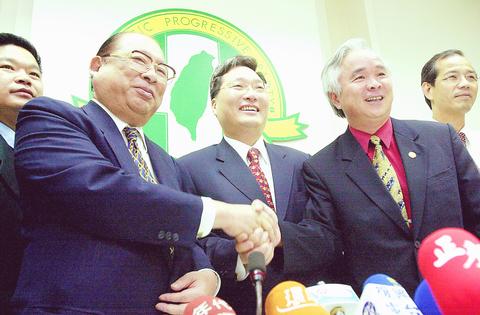Business leaders visited lawmakers from across party lines yesterday to line up support for a proposal to suspend the securities transaction tax for one year -- a measure aimed at helping the nation's sluggish economy.
But legislative caucus leaders refused to commit to the idea yesterday, saying more discussion was needed before the proposal goes forward.

PHOTO: LIAO RAY-SHANG, TAIPEI TIMES
Critics have said suspending the 0.3 percent tax would do little to help the economy, as the most likely effect would be just a one or two-day boost to the stock market.
Stocks are well off their highs because the outlook for the global economy is poor, they say, not because the stock transaction tax makes owning equities unattractive.
"Suspending the tax would not provide incentives for investors to invest more in the local stock market," said Spencer White, head of Merrill Lynch in Taiwan.
A proposal to suspend the tax was put forward at last month's Economic Development Advisory Conference, but foundered after there was no consensus to adopt the measure.
Another measure that also failed to win consensus support was a cut to the capital gains tax for property transactions.
But despite the lack of a consensus, the Cabinet has proposed reducing the tax for two years -- leading business leaders to think they can also win a suspension of the stock transaction tax.
"The business sector isn't against taxes," said Gary Wang (王令麟), a lawmaker with the KMT and the chairman of the ROC General Chamber of Commerce.
"But Taiwan's economy is like a heart attack patient who remains in intensive care, in urgent need of a heart stimulant."
Business leaders argue that suspending the stock transaction tax would boost the market and help Taiwan's roughly 7 million retail investors.
Lin Kun-chung (
Turnover yesterday was a paltry NT$27 billion, compared to the NT$200 billion that was typical during the bull market early last year.
"We hope that the tax can be shelved for one year to stimulate the stock market," Lin said, saying it would give investors more confidence to put money into stocks.
Wang said that a one-year suspension of the tax would likely decrease government revenue by roughly NT$30 billion. But applying a little "supply-side" theory, the legislator said a revived stock market would mean higher revenue from business, commodity and income taxes as well as customs duties.
The government has suspended the securities transaction tax six times between 1960 and 1986 as a part of its efforts to stimulate the economy.
Taiwan's competitors -- including Singapore and South Korea -- have recently adopted tax cuts to aid their economies, Wang said.
But many lawmakers weren't sold on the idea yesterday.
Tsai Huang-liang (
Economists are also divided on how suspending the tax could benefit the broader economy.
Tsai said yesterday the DPP caucus would discuss the proposal at its next meeting on Sept. 18.

CHAOS: Iranians took to the streets playing celebratory music after reports of Khamenei’s death on Saturday, while mourners also gathered in Tehran yesterday Iranian Supreme Leader Ayatollah Ali Khamenei was killed in a major attack on Iran launched by Israel and the US, throwing the future of the Islamic republic into doubt and raising the risk of regional instability. Iranian state television and the state-run IRNA news agency announced the 86-year-old’s death early yesterday. US President Donald Trump said it gave Iranians their “greatest chance” to “take back” their country. The announcements came after a joint US and Israeli aerial bombardment that targeted Iranian military and governmental sites. Trump said the “heavy and pinpoint bombing” would continue through the week or as long

TRUST: The KMT said it respected the US’ timing and considerations, and hoped it would continue to honor its commitments to helping Taiwan bolster its defenses and deterrence US President Donald Trump is delaying a multibillion-dollar arms sale to Taiwan to ensure his visit to Beijing is successful, a New York Times report said. The weapons sales package has stalled in the US Department of State, the report said, citing US officials it did not identify. The White House has told agencies not to push forward ahead of Trump’s meeting with Chinese President Xi Jinping (習近平), it said. The two last month held a phone call to discuss trade and geopolitical flashpoints ahead of the summit. Xi raised the Taiwan issue and urged the US to handle arms sales to

State-run CPC Corp, Taiwan (CPC, 台灣中油) yesterday said that it had confirmed on Saturday night with its liquefied natural gas (LNG) and crude oil suppliers that shipments are proceeding as scheduled and that domestic supplies remain unaffected. The CPC yesterday announced the gasoline and diesel prices will rise by NT$0.2 and NT$0.4 per liter, respectively, starting Monday, citing Middle East tensions and blizzards in the eastern United States. CPC also iterated it has been reducing the proportion of crude oil imports from the Middle East and diversifying its supply sources in the past few years in response to geopolitical risks, expanding

Pro-democracy media tycoon Jimmy Lai’s (黎智英) fraud conviction and prison sentence were yesterday overturned by a Hong Kong court, in a surprise legal decision that comes soon after Lai was jailed for 20 years on a separate national security charge. Judges Jeremy Poon (潘兆初), Anthea Pang (彭寶琴) and Derek Pang (彭偉昌) said in the judgement that they allowed the appeal from Lai, and another defendant in the case, to proceed, as a lower court judge had “erred.” “The Court of Appeal gave them leave to appeal against their conviction, allowed their appeals, quashed the convictions and set aside the sentences,” the judges